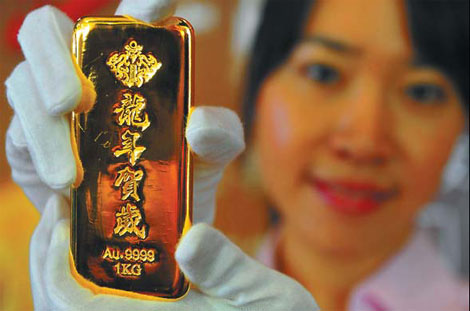Nation urged to increase holdings of gold
Updated: 2011-12-27 07:57
By Wang Xiaotian (China Daily)
|
|||||||||
|
Gold displayed at a shop in Shanghai. As of December, China ranked sixth worldwide in gold holdings, with about 1,054 tons, says a report released by the World Gold Council. Provided to China Daily |
BEIJING - China should further diversify its foreign-exchange portfolio and make more gold purchases when the metal's price dips but is still at a relatively high level, a senior central bank official said on Monday.
"The Chinese government should not only be cautious of the imported risk caused by rising global inflation, but also further optimize its foreign-exchange portfolio and purchase gold assets when the gold price shows a favorable fluctuation," said Zhang Jianhua, director of the research bureau affiliated with the People's Bank of China (PBOC).
He made the remarks in an article in the Beijing-based Financial News, a newspaper run by the PBOC.
The spot gold price declined 16 percent over the past three months to less than $1,600 an ounce last week. It touched a record of more than $1,900 in early September.
Zhang said bleak economic conditions, increasing international liquidity as countries turned to monetary easing and the resulting high inflation had dampened investors' confidence. He said that gold had become the only "safe haven" for risk-averse investors. "No asset is safe now. The only choice to hedge risks is to hold hard currency - gold."
Zhang didn't specify what proportion of China's $3.2 trillion foreign reserves should be held in gold.
China is the largest foreign holder of US Treasury securities, having invested about one-third of its foreign reserves in those bonds. About 20 percent has been invested in euro-denominated assets.
As of this month, China ranked sixth worldwide in gold holdings, with about 1,054 tons. The value accounted for about 1.8 percent of the country's total foreign reserves, according to a report released by the World Gold Council (WGC).
The US topped the list by holding more than 8,133 tons of the metal, 76.6 percent of its foreign reserves by value, while Germany ranked second by holding 3,396 tons, 73.7 percent of its reserves.
In 2011, countries including Russia, Thailand, South Korea, Bolivia, Colombia, Kazakhstan and Venezuela purchased the metal to increase gold holdings of their central banks' reserves.
China didn't sell or buy gold from 2010 to 2011, according to WGC statistics.
"The PBOC may have realized that its euro-denominated assets are in greater danger than it expected and started to eye gold," said Li Jie, director of the foreign-reserves research center at the Central University of Finance and Economics.
"But it's impractical for China to put its foreign reserves into commodities, including gold, because all these markets are too small for such a big hoard.
"For example, China's purchasing gold would push up the price of the metal and increase its own cost," said Li.
Li added that there was no easy way for China to get as much gold as it wished because major economies such as the US hold the majority of gold and market supplies are very limited.
China produced 31.75 tons of gold in October, the Ministry of Industry and Information Technology said on Monday. Gold production gained 5 percent in the first 10 months of this year to 290.752 tons.
Driven by increasing demand from risk-averse investors, the international price of gold repeatedly reached new highs in 2011.
Central banks made their biggest gold purchases for a single year in 2011 since the Bretton Woods system dissolved in 1973 and major currencies began to float against each other without being pegged to gold. China has vowed to further diversify the nation's foreign-reserve portfolio amid growing global financial uncertainty. In October, it cut holdings of US Treasury securities by $14.2 billion to $1.13 trillion, the lowest level this year.
Media reports have said that the PBOC plans to create a fund worth $300 billion to invest the country's foreign reserves in the US and European markets. The fund will reportedly seek to invest in real assets and company shares, rather than government securities.











